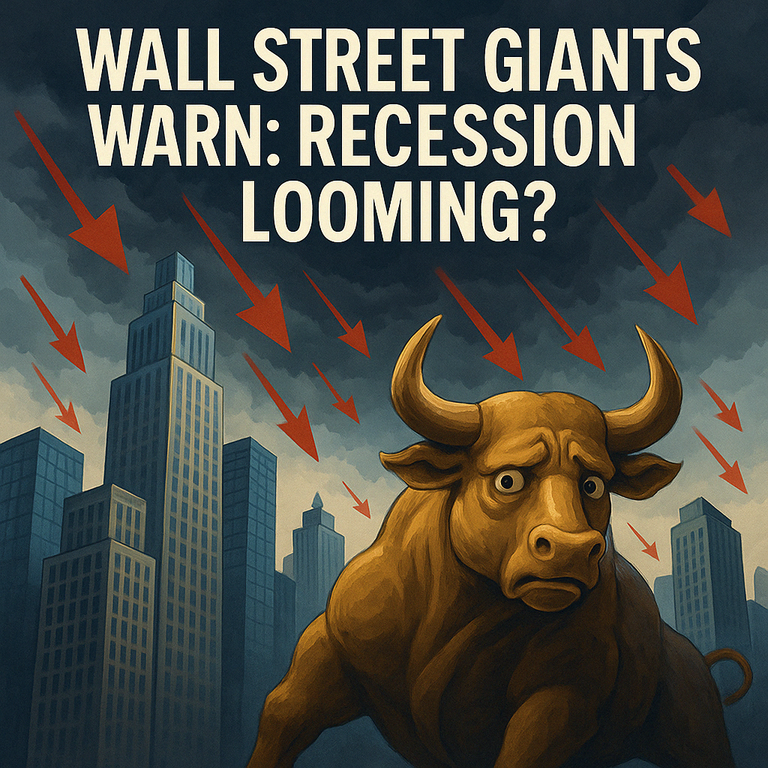Wall Street giants warn: recession looming?

In recent days, three of the biggest names in the financial market — Larry Fink (BlackRock), Jamie Dimon (JPMorgan Chase) and Ray Dalio (Bridgewater Associates) — have issued strong warnings about a possible imminent risk of recession in the United States.
What did they say?
Recently, at the Economic Club of New York, Fink said that many CEOs already consider the US to be in recession. He pointed to falling demand for air travel and rising inflation as clear signs, exacerbated by tariffs imposed by President Trump.

In his annual letter to shareholders, Dimon estimated a 50% chance of a recession, citing persistent inflation, high fiscal deficits and volatility in financial markets. He warned that without a swift resolution of trade tensions, there could be a “disastrous” fragmentation of the US's long-term economic alliances.

In an interview with NBC's “Meet the Press,” Dalio expressed concern that the U.S. is “very close to a recession” and that if mismanaged, the situation could be “worse than a recession.” He compared Trump's tariffs to “throwing stones at the production system” and highlighted the risk of a new global monetary order, driven by rising US debt and geopolitical tensions.

What does this mean to you?
To me, this warning by three of the biggest names in the global financial market is a clear sign that we are about to enter an age of unprecedented instability — not only economic, but political and social as well. When individuals such as Larry Fink, Jamie Dimon and Ray Dalio, with decades of experience and access to information far greater than what we hear in the news, start sounding the alarm, it is because the threat is real and imminent.
What I find most remarkable is not even the likelihood of recession, but the chance that we could be on our way to something worse — a breakdown in the global monetary system. This indicates profound changes in how money is circulating, handled and valued around the globe. If true, it will not be just the financial market that will be affected: it will be our purchasing power, savings, investments, employment and even families' financial security.
The feeling is that we are a moment in history when politics — such as imposing trade tariffs, running budget deficits and monetary policy — is being pursued more and more recklessly, as though we are all passengers on a vessel with captains who cannot even agree on the direction in which to steer.
This, to me, has two dimensions:
It is time to be even more careful than usual. Consume good information, vary sources, better understand macroeconomic trends and reflect more strategically before investing or spending.
It is time for resilience. Expect instability, have alternatives, categorize what is essential and have a flexible approach, capable of adapting to whatever comes up.
Briefly stated, this warning is more than an economic forecast — it is a call for individual caution and responsibility in an increasingly integrated and volatile world.
How to protect your assets?
When three of the biggest names in global finance warn of a possible recession — or, worse, a systemic crisis — wealth preservation is no longer merely a concern for big investors, but for everyone interested in their personal financial well-being.
Here are practical and strategic measures to protect yourself:
- Diversify intelligently
Diversification remains the best defense against volatility. However, in a climate of worldwide uncertainty, it has to be more than simple:
Geographically: Don't place all your bets on US or European economy-sensitive assets.
By asset class: blend equities, fixed income, precious metals, real estate funds and even real assets.
Include resilient assets: gold, silver, and even cryptocurrencies (in moderation and with study) can serve as protection against currency devaluation and monetary instability.
Preserve liquidity
In times of crisis, having quick access to cash is more valuable than chasing high returns. A well-structured emergency fund, in low-risk, highly liquid assets, can prevent you from having to get rid of investments in bad times.Avoid unnecessary debt
With rising interest rates and inflation being uncertain, debt is a silent destroyer of wealth. Prioritize debts with floating or high interest rates, and think twice before assuming new financial commitments.Invest in knowledge
The best protection is knowledge of what is taking place. Understanding economics, monetary policy, market direction, and the real impact of policies like trade tariffs or money printing is an asset in itself. The more you understand, the better you will be able to make sound decisions.Hold real assets
Assets in prime locations, land or income-generating properties (e.g., equipment or own businesses) will hold value even during periods of financial uncertainty.Consider global risks
With Dalio referring to a possible new monetary order, it is prudent to gauge the risk of exposure to the dollar, US public debt, and dependence on one economic system. Decentralization of assets can be a form of protection, especially in times of "changing game rules".
In short:
Protecting your wealth nowadays requires more than money — it requires vision, prudence and planning. What's occurring now serves to remind us that the world of money is international and vulnerable to political capriciousness and global shock. Those who remain vigilant, connected and tactically positioned will be not only be capable of protecting what they have, but actually gain from the chaos.
Posted Using INLEO
https://www.reddit.com/r/economy/comments/1k3kl11/wall_street_giants_warn_recession_looming/
The rewards earned on this comment will go directly to the people( @rose98734 ) sharing the post on Reddit as long as they are registered with @poshtoken. Sign up at https://hiveposh.com. Otherwise, rewards go to the author of the blog post.